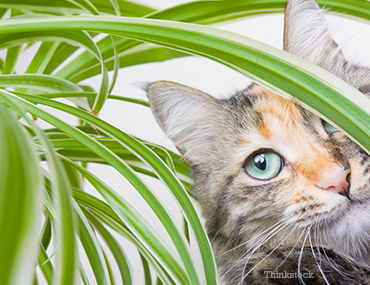
I’m very passionate about educating cat owners on the dangers of houseplants for cats. That’s because my own sister’s cat (that I gave her) died of acute kidney failure secondary to getting into dangerous Asiatic lilies from a bouquet several years ago.
While I want you to know what plants to be wary of, I’ll admit that I have at least 10 houseplants in my house. You just need to know which are potentially dangerous to cats as some are very safe. The majority of plants may cause drooling, vomiting and diarrhea when ingested by cats but not death. [Editor's note: Of course, it's always a good idea to call your veterinarian if you notice that your cat's ingested anything abnormal. Are you a dog parent as well? Check out Poisonous Plants and Dogs.]
Why does my cat eat plants?
Personally, I feel like cats are craving a different texture or the feel of fiber in their mouth. Keep in mind that cats are true carnivores; they only really need meat-sourced food. (Cats should never be made into vegetarians, as it can cause life-threatening amino acid deficiencies.) If your cat likes to chew on plants, I recommend purposely growing cat grass for them (often found in pet stores); it’s very safe, but can result in vomiting when ingested.
What plants are the most dangerous for my cat?
True lilies of the Lilium or Hemerocallis species are very toxic. Examples of some of these lilies include the following:

- Tiger lilies
- Day lilies
- Asiatic hybrid lilies
- Japanese show lilies
- Easter lilies
- Rubrum lilies
- Stargazer lilies
- Red lilies
- Western lilies
- Wood lilies
All parts of these lilies are highly toxic to cats! Even small ingestions (2-3 petals/leaves, the pollen, or even water from the vase) can result in severe, acute kidney failure. Learn more about these lilies here.
Cardiac glycosides like foxglove, lily of the valley, kalanchoe, Japanese yew, etc. are also very dangerous. Most of these grow outside, but it’s important you know the name of every plant that you bring into your house. This type does not cause kidney failure, but can cause life-threatening heart arrhythmias and death when ingested by dogs or cats.
Other common houseplants that cats like to chew on are Dieffenbachia or philodendron. These plants contain insoluble calcium oxalate—not soluble calcium oxalate (like so many websites erroneously mention) which causes oral pain when chewed on. This isn’t life-threatening, however, and typically results in foaming and frothing at the mouth. My advice is to keep these plants elevated and out of reach. If your cat does get into one, contact your veterinarian. She may suggest that you offer something tasty to flush out the mouth: a small amount of chicken broth, canned tuna water (not oil!), or even chicken noodle soup. If your cat continues to vomit, a veterinary visit is a must.
Can I have plants in my house and still keep my cat safe?
Yes, I keep one spider plant in my house to act as a “sacrifice” to my cats; they love to chew on the long fronds of this plant, and it’s very safe. My cats typically leave my other plants alone as they prefer the spider plant! That said, like the majority of plants out there, the spider plant can cause some vomiting when ingested. For the rare cat that devours large amounts of plant material, there’s a small chance that the long fronds of the spider plant can tie together and get stuck in the stomach. But a few bites? No biggie.
Here are my simple, cat-friendly (and plant friendly) rules:
No fresh cut flowers or bouquets of flowers in the house. If you can’t confidentially identify Lilium or Hemerocallis spp. (what we call “true lilies”) then it’s a big no-no.
When in doubt, take pictures of your plants and write down the genus name, if possible. You can call animal poison control and your veterinarian to be safe.
If you do want plants to coexist with your cats, consider these "cat-safe" ones; they are in a veterinarian’s house:
- Spider plant
- Wandering Jew
- Christmas cactus
- Bromeliads
Keep in mind that the majority of plants are relatively safe but may cause vomiting and diarrhea. Of course, if your cat is seen consuming any part of a plant, and you’re not sure it’s safe, call your veterinarian or ASPCA Animal Poison Control Center for life-saving information.
If you have any questions or concerns, you should always visit or call your veterinarian -- they are your best resource to ensure the health and well-being of your pets.
